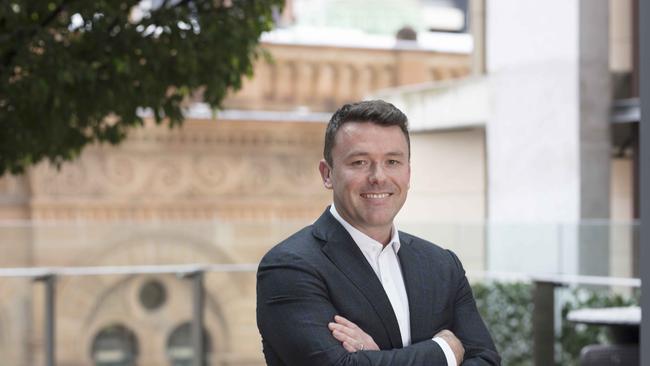More professionals taking a leap of faith to join start-ups, so big business must lift its game
Big businesses face a huge challenge as professionals in Australia and elsewhere flock to creative start-ups. See why employees are making the switch.

SmartDaily
Don't miss out on the headlines from SmartDaily. Followed categories will be added to My News.
The attraction of working for a start-up is putting pressure on big businesses to change or risk losing professional talent.
Despite 75 per cent of start-ups going out of business quickly, a new global survey has found that 50 per cent of professionals would prefer the experience of working in a start-up, and the number who have already made the move has jumped 20 per cent in the past 12 months.
The Robert Walters Global Employee Survey 2021 shows a 4.5 per cent increase in the number of Sydney professionals moving to start-ups.
Andrew Hanson, managing director of Robert Walters NSW, says workers are drawn to the passion, personality, agility and authenticity of start-ups and the many perks that come with them.
He says working in a small team with a flat structure provides exposure to senior leadership early in your career, a chance to prove your worth quickly and be recognised while experiencing continuous learning and instant results.
Thirty per cent of professionals say the most appealing thing about a start-up is the open and effective management structure, while others like the freedom, respect, and less red tape.
On average, decisions are processed four times quicker in a start-up than a large firm.

The global survey found 33 per cent of professionals are leaving corporate jobs to “try something new”, with a further 15 per cent looking to re-skill.
“This is where big businesses need to try and compete,” Hanson says. “They have the resources and capability to work these ways as well.”
But he warns organisations “with tens if not hundreds of legacy systems” and employees who rigidly follow traditional processes, will risk losing talent.
“Entrenched ways of working make quick decision making and green fields work practices difficult,” he says.
ISN’T IT RISKY?
Hanson says despite most start-ups failing, it is failure that is integral to those that survive and it inspires innovation.
He says the risk diminishes the further the start-up is along the funding path, with Series B and Series C businesses able to pay well and recruit the right people.
WINNING CULTURE
The survey found four key factors that make start-ups attractive:
1. Passion: The reason work doesn’t always feel like work and why the long hours feel worth it. It’s what defines the existence of the business and acts as a great team motivator.
2. Personality: What makes the start-up unique – what cannot be found anywhere else.
3. Agility: The ability for knowledge and information to flow at a pace that greatly improves all aspects of the business. It’s the more visible factor as it can be identified in the way workers work, offices are organised and brainstorming sessions are carried out.
4. Authenticity: Has to do with the freedom and respect of each individual’s own identity.
Hanson says big businesses could learn from these key points to create a flexible future-focused model.
“They need to focus on the tasks that need to be done, the resources they need to do them and the way they bring people together to do those things.”

DIVERSITY
The study found start-ups’ focus on finding the best talent created greater diversity in skillsets and co-workers, and led employees to have a global vision.
The diversity also extends to tasks, with no two days the same and team members juggling many hats and taking on duties outside their roles to contribute to the business’s success.
Hanson says this helps employees learn new skills quickly and experience senior management early in their careers – something that doesn’t always happen at big firms.
“Larger organisations must put continuous learning on the table but they need to commit resources and allow people to invest in themselves, to retrain and retool,” he says.
AUSTRALIAN MIX
The survey shows that in Sydney, there is a strong likelihood those looking to work at a start-up will be male – 62 per cent – with 38 per cent of the city’s start-up talent pool being female.
The start-up culture is seeing a global explosion in senior roles, with the quickest growth in these job titles: senior product designer, product specialist, strategic adviser, principal software engineer, chief product officer.
SEEKING SIDE HUSTLES
A new survey from adventure marketplace Adrenaline has found Gen Z and Millennials are taking on side hustles outside work to spark their creativity and sense of adventure.
Eighty-one per cent of the more than 1000 surveyed believed the 9-5 work model was dead, more than a third were unsatisfied or indifferent about their current job, and 24 per cent were frustrated by the lack of flexibility and limited creative opportunities at work.
The majority (87 per cent) say they want to pursue a side hustle, with 62 per cent hoping to start one in the near future.
Organisation psychologist and How I Work podcast host Dr Amantha Imber says lockdowns have created a strong urge for flexibility and creativity.
“Two years is a long time to have so many freedoms taken away, now there is a rebound effect,” she says.
“One in four young Australians are frustrated with the lack of flexibility, I think this speaks to the fact that there are really new expectations on employers in the post-pandemic world.
“If you are not offering flexibility in terms of hours and where people can work from then they’re probably going to cut back hours with you or look for opportunities elsewhere.”

Mark Read, 20, of Hurlstone Park, in NSW, gave up his carpentry apprenticeship for a casual shopfitting job so he could pursue his photography side hustle.
“I wanted to make something out of photography before I got too old,” he says.
Read says he didn’t fear taking the leap of faith and encourages others with enough financial security to do it.
“It was more the fear of being stuck in a job I don’t want to be at,” he says.
“Do it now. As long as you have saved up enough so you can support yourself for the first few months, so you have something to fall on, you should be confident to take a leap. At least try it once before you are stuck in a job you don’t want to be at long term.”
Want a new side hustle? Adrenaline’s Best Job in the World competition gives you the chance to join an Adenaline crew on a contract worth $100,000. Visit adrenaline.com.au/blog/the-best-job-in-the-world


